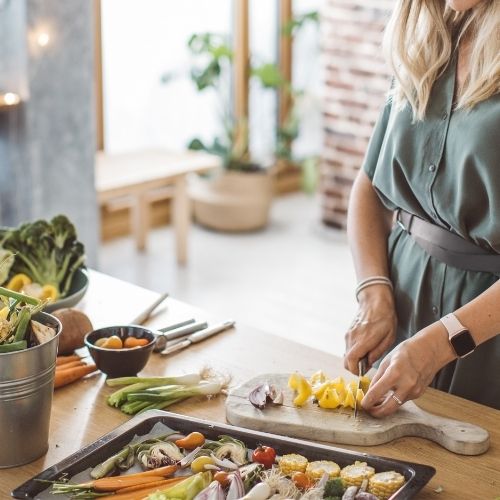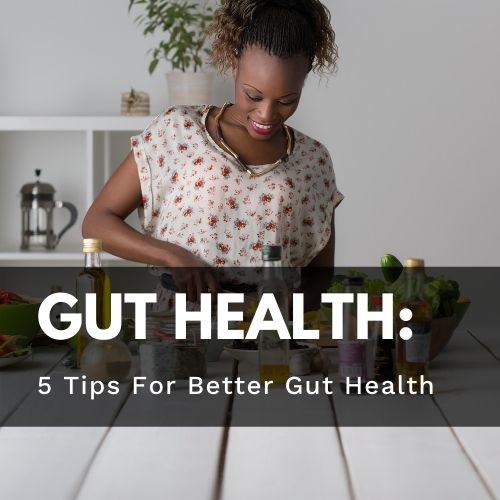Your Cart is Empty
COLLECTIONS:
SPECIAL OFFERS:
LEARN:

Collagen vs. Biotin: Key Differences Explained
December 20, 2022 5 min read
When you do a quick search for the best supplements for hair and skin, you will likely come across biotin and collagen.
Collagen and Biotin are different nutrients, but they are often used for similar reasons. In this article we will discuss their key similarities and differences.

Collagen Overview:
Our bodies contain a lot of collagen. In fact, collagen makes up 30-40% of the body’s protein [1].
Collagen exists in many parts of the body. It is found in connective tissue (tendons and cartilage), bones, skin, joints, and muscles [2].
Because collagen is so widely available in the body, it plays many important roles, including:
- Supporting bone structure and strength [3]
- Promoting skin strength and elasticity [4]
- Providing cushion at your joints and acts as a shock absorber during impact exercise [5]
Our bodies are able to produce collagen naturally, but getting an extra boost from food (gelatin, bone broth, pot roast) or supplements can provide health benefits as well.
Various studies have looked at the impact of collagen supplementation and the results are impressive. Collagen supplementation has been shown to improve bone density, increase skin smoothness and decrease wrinkles, support gut health, improve joint comfort, and even increase exercise performance [6–13].
Given collagen’s large influence and positive track record, its popularity is not surprising.
Biotin Overview:
Biotin (vitamin B7) is one of eight water-soluble B-vitamins [14,15]. Similarly to collagen, biotin has many roles in the body.
This vitamin has influence down to the cellular level. It is used for the metabolism of macronutrients, cell and gene signaling, and DNA regulation [16].
Biotin can be found in both plant and animal food sources. Beef, eggs, salmon, yogurt, spinach, broccoli, apples, whole wheat bread, almonds, and bananas are all excellent sources of biotin [16].
Similarities Between Biotin and Collagen
Below are some of the main similarities between biotin and collagen.
Safety:
When it comes to supplementing with biotin and collagen, both are considered safe to use.
Collagen supplements have been reported to have no adverse effects [21]. Biotin is also reported to be safe and adverse effects are rare [16]. Because biotin is a water-soluble vitamin, it is difficult to reach a toxic level of it in our bodies. Our bodies pass excess water-soluble vitamins, such as biotin, through our urine.
Thus, taking a biotin or collagen supplement is unlikely to do any harm.
Impact on Hair, Skin, and Nails:
Biotin and collagen are both used in the supplement world for their impact on hair, skin, and nails.
Collagen has been shown to improve skin elasticity, hydration, and smoothness [7, 8]. There are not many articles looking specifically at collagen supplementing and hair quality. However, there is reason to believe that a collagen supplement could help.
Keratin is the main protein found in hair [17]. Many of the amino acids found in collagen are also found in keratin [18-19]. By providing our bodies with these amino acids from collagen, we can support keratin production.
Therefore, it could be theorized that a collagen supplement could support hair growth and strength. However, specific studies are needed in order to make a definitive claim.
There is also evidence to support the beneficial role of biotin on hair and skin. In fact, research has shown that biotin is able to strengthen hair and nails and promote healthier skin [16, 20].
Differences Between Collagen and Biotin:
Below is a review of the main differences between collagen and biotin.
How We Get It:
One of the main differences between collagen and biotin is how our bodies get it. As previously mentioned, our bodies can create collagen internally. However, the production of collagen slows with aging. Food and supplements help to give your body an extra boost that can help in a variety of ways.
On the other hand, biotin is considered an “essential nutrient”. This means that it is a nutrient that your body needs to function normally. Our bodies cannot create essential nutrients on their own. Thus, we need to get biotin through diet or supplementation.
Health Impact:
We have already discussed how both biotin and collagen have an impact on skin and hair. However, collagen and biotin appear to impact different types of people. This is important to be aware of when deciding which supplement is appropriate for you.
Collagen has been shown to have an impact on a wider audience. In fact, collagen has been shown to help people with skin issues and those with healthy skin [7-8].
Although biotin may be taken by healthy people, the research shows that it is only helpful for those with pre-existing brittle nails, hair loss, and skin rashes. These are all sign of a biotin deficiency [16, 20].
While collagen shows an improvement of the skin of healthy individuals, the research does not show a benefit from biotin supplementation on those with already healthy hair, skin, and nails [20]. Because low biotin is rare, it is unlikely that a supplement is needed unless one of these issues is present.
Which Is Better, Collagen or Biotin?
Because collagen and biotin are both different nutrients (a protein versus a vitamin) and play such different roles in the body, it is difficult to say one is better than the other.
While collagen primarily supports the connective tissue in our body, biotin is responsible for aiding the metabolism of nutrients we eat. These are very distinct, but important roles in the body.
When it comes to whether you should supplement or not, this is a good question to ask. If you are a healthy individual looking to support your skin, bones and joints, a collagen supplement is probably the better option.
If you suffer from conditions causing hair loss, skin rashes, and/or brittle nails, the biotin supplement would most likely take top priority.
Conclusion:
Both collagen and biotin are important for healthy bodily function. Collagen provides structure and strength to our connective tissue and major organs while biotin is responsible for carrying out essential metabolic processes.
Their similarities and differences are important to keep in mind when deciding between a biotin and collagen supplement. Most importantly, your doctor or a registered dietitian will be able to lead you in the right direction based on your specific health status and needs. Consult with them in order to make the best choice on which supplement to invest in.
_________________________________________________________________

Natalie Kravat, RDN, LDN, MS is a registered dietitian that is devoted to helping others find a love for healthy eating as well as being successful in reaching health goals. She has a passion for using whole foods to create delicious and convenient recipes and teaches others to use their creativity to do the same!
_________________________________________________________________
References:
- https://bionumbers.hms.harvard.edu/bionumber.aspx?s=n&v=4&id=109730
- https://www.hsph.harvard.edu/nutritionsource/collagen/#:~:text=Collagen%20is%20the%20most%20abundant,muscles%2C%20tendons%2C%20and%20cartilage.
- https://www.bones.nih.gov/health-info/bone/bone-health/what-is-bone
- https://benthamopen.com/contents/pdf/TONUTRAJ/TONUTRAJ-8-29.pdf
- https://pubmed.ncbi.nlm.nih.gov/18416885/
- https://www.ncbi.nlm.nih.gov/pmc/articles/PMC5793325/
- https://www.ncbi.nlm.nih.gov/pmc/articles/PMC6835901/
- https://www.ncbi.nlm.nih.gov/pmc/articles/PMC8824545/#:~:text=The%20evidence%20from%20the%20reviewed,effects%20of%20its%20oral%20supplements.
- https://pubmed.ncbi.nlm.nih.gov/35639457/
- https://pubmed.ncbi.nlm.nih.gov/30368550/
- https://rua.ua.es/dspace/handle/10045/121430
- https://pubmed.ncbi.nlm.nih.gov/30783776/
- https://link.springer.com/article/10.1007/s00726-021-03072-x
- https://www.hsph.harvard.edu/nutritionsource/biotin-vitamin-b7/
- https://www.hsph.harvard.edu/nutritionsource/vitamins/vitamin-b/
- https://ods.od.nih.gov/factsheets/Biotin-HealthProfessional/#h11
- https://www.ncbi.nlm.nih.gov/pmc/articles/PMC4201279/#:~:text=Hair%20is%20a%20filamentous%20biomaterial%20consisting%20mainly%20of%20proteins%20in%20particular%20keratin.
- https://www.ncbi.nlm.nih.gov/pmc/articles/PMC3258107/
- https://pubmed.ncbi.nlm.nih.gov/28687386/#:~:text=Collagen%2C%20irrespective%20of%20its%20origin,not%20occur%20in%20other%20proteins.
- https://www.ncbi.nlm.nih.gov/pmc/articles/PMC5582478/
- https://pubmed.ncbi.nlm.nih.gov/30681787/
Leave a comment
Comments will be approved before showing up.
Also in Health
Subscribe
Sign up to get the latest on sales, new releases and more …
Join the Utzy Naturals Club!
Sign up and get the latest on sales, new releases, and more...









